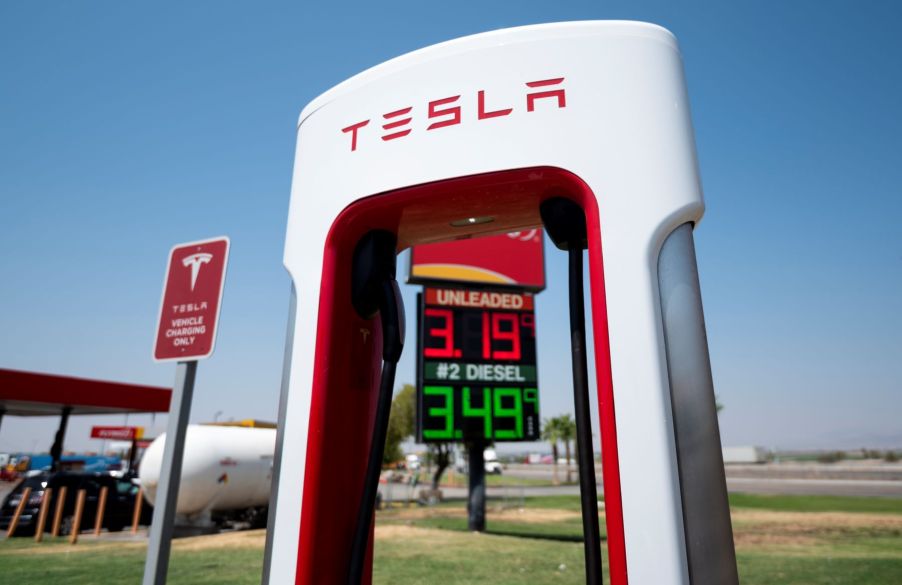
How Long Will an EV Battery Last?
Like many other people, you’re in the market for your first-ever electric vehicle. There are a lot of questions that spring up around that time. First and foremost is the longevity of the EV, and more specifically, the battery. Does an EV battery life last as long as you want to own the car? How long will an EV battery last?
EV batteries degrade over time, just like your iPhone

All batteries degrade over time, and there isn’t much you can do about it. You can, however, prolong the battery life by taking proper care of it. Moreover, that isn’t much different from an internal combustion engine vehicle. An engine’s proper care and maintenance make it last as long as possible. If you’re familiar with the endless cycle of needing a new phone battery (or a new phone) because the battery doesn’t last as long anymore, you’re familiar with battery degradation.
According to Review Geek, every time you charge a smartphone to 100% and let it discharge to zero, that’s a charge cycle on the Lithium-ion battery. Over time, more charging cycles degrade the battery, and even when it says 100% charged, it’s actually about 80%. Moreover, the total battery capacity decreases throughout the phone’s life. EV batteries are no different, though not quite as bad as smartphones. RG says not to worry, as EV batteries are built to degrade extremely slowly and last longer than you’ll probably own the vehicle.
How long do EV batteries last?

That still doesn’t answer the question, “how long will an EV battery last?”. The short answer is that it depends on a multitude of different things. Furthermore, driving and charging habits, charging speeds, climate, storage, etc., all make an impact. Experts suggest that EV batteries will typically last anywhere from 10-20 years. Fortunately, that’s significantly longer than the average person owns their vehicle—best of all, most automakers back up the claim of a battery lasting this long. Many EV batteries come with an eight-year warranty, so if yours is a dud, many dealers will replace it for free. In addition, several federal regulations require manufacturers to provide an eight-year, 100,000-mile warranty with their EV batteries.
Unfortunately, the battery will still be degrading over time. After eight years, though it’s still competent, your EV battery will likely be operating at about 70% capacity. Think of it like your gas tank getting smaller year after year. The good news is that most people don’t drive enough daily for it to be a noticeable problem, and there are steps you can take to prolong your battery’s life.
How to extend your EV battery life

Nothing is guaranteed, but there are a few things you can do to extend your EV battery life. More importantly, you should know that things like temperature can impact battery life. Someone who lives in a frigid climate all year-’round will likely see decreased capacity earlier in the EV’s life than other owners. Here are a few tips to prolong battery life from Review Geek:
- Minimize exposure to excessively high or low temperatures
- Minimize time spent at a 100% charged state
- Never let the battery reach 0
- Avoid fast-charging stations
Each time the battery reaches 0 or sits at 100% for too long, battery cells die. This will cause the battery to degrade more quickly. Fortunately, automakers usually allow owners to control charging capacity, so even leaving it plugged in overnight, the EV will stop at 80-90%. In addition, fast charging is beneficial for long road trips when you need to get back on the road quickly. However, all the power the chargers provide adds heat to the battery, which will increase degradation over time.
Can you replace your EV battery?

So you’ve owned your EV for 15 years, cared for it thoroughly, and it’s finally dead. If your only remaining option is to replace the EV battery, there’s good news. Yes, you can replace your EV’s battery whenever necessary. For example, Chevy is currently replacing battery cells in Bolt EV models because of a recall. RG says it isn’t too complicated of a process for their trained mechanics.
However, replacing the entire battery can require a specialized shop, a trained mechanic at a dealer, and other special services. That’s why it might be a bit costly. Depending on the depreciation level of a 10+-year-old vehicle, it might end up being too expensive to be worth replacing. Battery packs themselves can cost more than $10,000, and that’s before paying someone for the labor of swapping out the batteries. If your EV lasts 15 years and needs a new battery, it might be better just to buy a new one.
How long will an EV battery last?
In short, the lifespan of an EV battery is not something consumers need to worry about. Almost everyone who owns a car owns it for less time than the packs will last. Those who receive a “bad” battery pack in a new electric vehicle will likely get a free replacement, thanks to mandatory regulation warranties. EV batteries will last you more than ten years and can reach as high as 20 with proper care.



